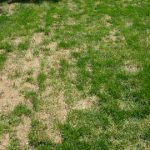Fertilizing your lawn is a crucial aspect of maintaining its health and beauty. At Erbert Lawns, we understand the importance of choosing the right fertilizer for your lawn. In this comprehensive guide, we’ll delve into the nuances of organic and chemical fertilizers, helping you make an informed decision for your lush, green haven.
- Organic Fertilizers: Nature's Touch
- Chemical Fertilizers: The Quick Fix
- The Comparison
- Erbert Lawns' Expertise
- Understanding the Nutrient Makeup
- Impact on Microbial Life
- Ease of Application
- Safety Considerations
- Long-Term Sustainability
- The Role of pH Balance
- Visual Appeal and Lawn Health
- The Choice for Gardeners and Homeowners
- Expert Guidance from Erbert Lawns
- Balancing Act: Combining the Best of Both Worlds
- Regulatory Considerations
- The Future of Lawn Care
- Your Lawn, Your Choice
- Conclusion
- Frequently Asked Questions
Organic Fertilizers: Nature’s Touch
Composition: Derived from natural sources like compost, manure, and bone meal.
Nutrient Release: Slow and steady, ensuring long-term nourishment.
Soil Health: Enhances soil structure and microbial activity.
Environmental Impact: Eco-friendly, with minimal risk of runoff or pollution.
Cost: Generally higher, but with long-term soil health benefits.
Chemical Fertilizers: The Quick Fix
- Composition: Synthetically manufactured to provide specific nutrients.
- Nutrient Release: Fast-acting, offering immediate results.
- Soil Health: Repeated use can lead to soil degradation.
- Environmental Impact: Risk of runoff, leading to water pollution.
- Cost: More affordable, but may require frequent applications.
The Comparison
- Effectiveness: Chemical fertilizers offer quick results, but organic options provide lasting health benefits to your lawn.
- Environmental Concerns: Organic fertilizers are the clear winner for eco-conscious homeowners.
- Long-Term Soil Health: Organic fertilizers contribute to soil fertility over time, unlike their chemical counterparts.
- Cost-Benefit Analysis: While organic options might seem pricier upfront, they reduce the need for future soil amendments.
Erbert Lawns’ Expertise
At Erbert Lawns, we specialize in both organic and chemical lawn treatments, tailoring our approach to your lawn’s specific needs.
Understanding the Nutrient Makeup
Organic and chemical fertilizers differ significantly in their nutrient composition. Organic fertilizers contain a broad spectrum of nutrients, albeit in varying quantities. They release nitrogen, phosphorus, and potassium, along with trace elements essential for plant growth, in a slow and steady manner. This gradual release mirrors the natural nutrient uptake process of plants. On the other hand, chemical fertilizers are formulated to provide specific ratios of these key nutrients, often leading to a quick but short-lived growth spurt in plants.
Impact on Microbial Life
The soil is a living ecosystem, teeming with microbes that play a crucial role in plant health and nutrient absorption. Organic fertilizers feed this microbial life, enhancing soil structure and fertility. In contrast, the high salt content in many chemical fertilizers can harm these beneficial soil organisms, leading to a reduction in soil biodiversity and health.
Ease of Application
When it comes to application, chemical fertilizers often take the lead in convenience. They are readily available in a variety of forms, such as granules, liquids, and spikes, making application relatively straightforward. Organic fertilizers, while equally diverse in form, may require more effort in terms of application and may need to be applied more frequently to achieve the desired results.
Safety Considerations
Safety is a paramount concern, especially in environments frequented by children and pets. Organic fertilizers, being derived from natural materials, are generally considered safer. However, it’s important to note that natural doesn’t always mean harmless. Some organic products can be harmful if misused. Chemical fertilizers, if not used according to instructions, can be hazardous, leading to burns on foliage or roots, and potentially harmful runoff.
Long-Term Sustainability
From a sustainability perspective, organic fertilizers are a clear winner. They are made from renewable resources and contribute to the circular economy by recycling waste materials into valuable lawn care products. Chemical fertilizers, while effective, rely on non-renewable resources like natural gas and phosphate rock, raising concerns about long-term sustainability and environmental impact.
The Role of pH Balance
Soil pH plays a crucial role in nutrient availability and uptake. Organic fertilizers can help maintain a balanced soil pH over time, promoting a healthy growing environment. Chemical fertilizers, especially those that are highly acidic or alkaline, can disrupt soil pH balance, requiring additional amendments to correct the pH levels.
Visual Appeal and Lawn Health
Aesthetically, both fertilizer types can produce lush, green lawns. However, the approach differs. Chemical fertilizers may lead to rapid growth and intense green coloration in a short period. In contrast, organic fertilizers promote steady, sustainable growth, resulting in a lawn that may take longer to develop its full beauty but will likely be healthier and more resilient in the long run.
The Choice for Gardeners and Homeowners
For the home gardener or lawn enthusiast, the choice between organic and chemical fertilizers often comes down to personal preferences, environmental values, and specific lawn needs. Those seeking immediate results might lean towards chemical options, while those prioritizing environmental impact and long-term soil health might prefer organic solutions.
Expert Guidance from Erbert Lawns
We at Erbert Lawns understand that every lawn is different. Our team of experts is equipped to provide personalized advice, taking into account your lawn’s specific conditions, your aesthetic goals, and your environmental concerns. Whether you choose organic or chemical fertilizers, our lawn care services are designed to deliver optimal results, ensuring your lawn remains a source of pride and joy.
Balancing Act: Combining the Best of Both Worlds
Interestingly, a hybrid approach, combining both organic and chemical fertilizers, can sometimes offer the best solution. This method allows for the quick-acting benefits of chemical fertilizers while maintaining the long-term soil health advantages of organic materials. Such a balanced approach can be particularly effective in transitioning lawns from chemical to organic care.
Regulatory Considerations
It’s also important to consider local regulations and guidelines regarding fertilizer use. Some regions have restrictions on certain types of chemical fertilizers, especially those contributing to nutrient runoff and water pollution. Staying informed and compliant with these regulations not only ensures legal adherence but also promotes responsible lawn care practices.
The Future of Lawn Care
As environmental awareness grows, the trend in lawn care is shifting towards more sustainable practices. Innovations in organic fertilizer technology, such as advanced composting techniques and bio-fertilizers, are making organic lawn care more effective and accessible than ever before. This shift is a positive step towards environmentally responsible lawn maintenance, aligning with the values of homeowners who care deeply about their impact on the planet.
Your Lawn, Your Choice
Ultimately, the decision between organic and chemical fertilizers is yours. Each type has its advantages and considerations, and what works best for one lawn may not be ideal for another. At Erbert Lawns, we’re committed to helping you navigate these choices, ensuring that your lawn not only looks its best but also aligns with your values and lifestyle.
Conclusion
Choosing between organic and chemical fertilizers depends on your immediate needs, long-term goals, and environmental considerations. At Erbert Lawns, we’re here to guide you through this decision, ensuring your lawn remains a testament to beauty and health. Contact us today to explore the best options for your lawn.
Frequently Asked Questions
What are the main benefits of organic fertilizers?
Organic fertilizers improve soil health and provide gradual, long-lasting nutrient release.
Can chemical fertilizers harm my lawn in the long run?
Excessive use of chemical fertilizers can lead to soil degradation and nutrient imbalances.
Are organic fertilizers more expensive than chemical ones?
Initially, yes, but they offer long-term cost savings by improving soil health.
How quickly will I see results with chemical fertilizers?
Results can be seen rapidly, often within a few days of application.
Is it safe to use chemical fertilizers around pets and children?
Caution is advised. It’s best to let the fertilizer settle and follow product guidelines.
Can I switch from chemical to organic fertilizers?
Absolutely! Transitioning to organic fertilizers can be beneficial for your lawn’s long-term health.










